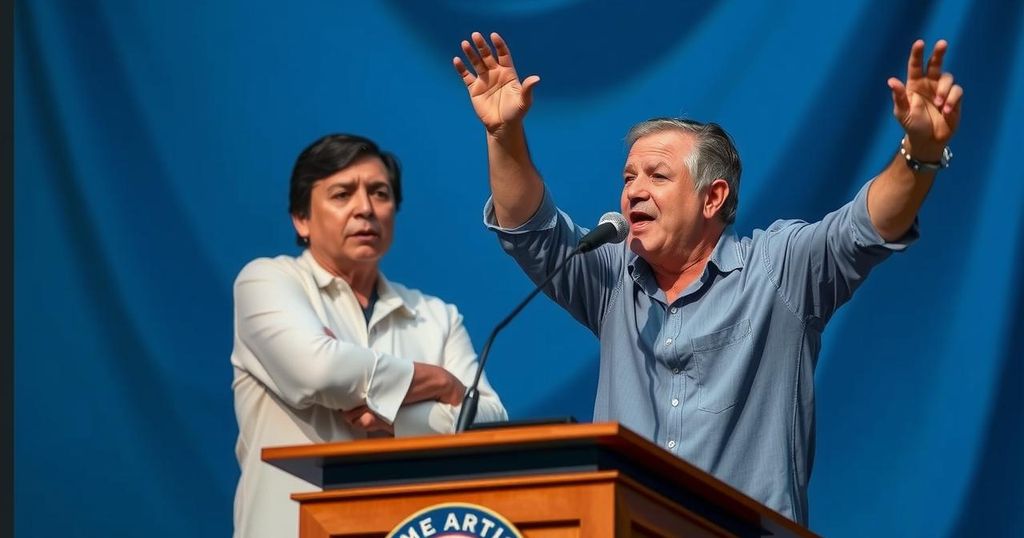Uruguay’s governing party has conceded defeat in the presidential run-off to left-wing challenger Yamandu Orsi, marking a return to power for the Broad Front after a conservative rule since 2020. The election underscores widespread voter frustration with incumbent parties globally, and Orsi’s moderate platform echoes previous governance policies. The transition promises to address social concerns while maintaining certain economic frameworks.
In a significant political shift, Uruguay’s governing party has conceded defeat to left-wing candidate Yamandu Orsi in a tightly contested presidential run-off election. Álvaro Delgado, representing the conservative coalition that has ruled since 2020, acknowledged the loss despite ongoing vote counts, expressing his sentiments with, “with sadness, but without guilt, we can congratulate the winner.” Orsi, from the centre-left Broad Front, is to take office following an era marked by progressive social reforms by his predecessors, signaling a return to left-wing governance after a brief conservative tenure.
As the vote count approached completion, with more than 57% of ballots tallied, the transition of power from the centre-right government under President Luis Lacalle Pou to the centre-left Broad Front is imminent. The Broad Front is renowned for progressive achievements such as the legalization of abortion and same-sex marriage during its previous 15-year rule, which ended in 2019 when Lacalle Pou was elected. Mr. Lacalle Pou has publicly extended his congratulations to Mr. Orsi, committing to facilitate a smooth transition.
Voter participation in the election was significant, with 89.4% of eligible citizens casting their ballots in this compulsory voting system. Initial results from independent quick counts indicated that Mr. Orsi secured approximately 49% of the vote, while Mr. Delgado garnered around 46%, reflecting a closely contested election. This shift in power mirrors a broader trend seen in multiple countries, where incumbents are facing backlash amid economic uncertainties stemming from the pandemic.
Despite the left’s return to power, Mr. Orsi advocates for a moderate agenda. He aims to address issues such as childhood poverty and organized crime without enacting radical reforms. His proposed policies are expected to continue the prudent economic approaches characteristic of the previous Broad Front government, suggesting a commitment to a balanced agenda that includes tax incentives and social security reforms, although certain advanced proposals met opposition from unions.
One voter, Yeny Varone, expressed her support for Mr. Orsi, noting, “He’s my candidate, not only for my sake but also for my children’s.” This sentiment encapsulates the hopes of many voters looking for improved social conditions and governance under Mr. Orsi’s leadership, emphasizing the expectations for a government that addresses both economic and social challenges in Uruguay.
In 2020, Uruguay saw the election of Luis Lacalle Pou, ending a 15-year period of governance by the left-wing Broad Front. This change represented a significant political shift within the country, as the Broad Front had been credited with implementing progressive social reforms, which garnered international recognition. Following the recent elections, the backdrop reveals a growing global trend where established governing parties are increasingly challenged by opposition forces amid discontent stemming from economic challenges post-pandemic. Mr. Orsi’s ascent reflects not only a local rebalancing but also participation in a global narrative of political discontent.
The outcome of Uruguay’s recent presidential run-off reflects a notable shift in the political landscape, with Yamandu Orsi poised to assume leadership following the concession from Álvaro Delgado. This election signifies a return to left-wing governance after a brief conservative rule, re-establishing a political environment characterized by social progressiveness. With committed voter participation and a vision for moderate governance, Mr. Orsi’s leadership may align with the previous administration’s policies while addressing pressing social issues.
Original Source: www.expressandstar.com







